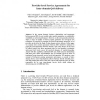Free Online Productivity Tools
i2Speak
i2Symbol
i2OCR
iTex2Img
iWeb2Print
iWeb2Shot
i2Type
iPdf2Split
iPdf2Merge
i2Bopomofo
i2Arabic
i2Style
i2Image
i2PDF
iLatex2Rtf
Sci2ools
140
click to vote
QOFIS
2004
Springer
2004
Springer
Provider-Level Service Agreements for Inter-domain QoS Delivery
In the current Internet, business relationships and agreements between peered ISPs do not usually make specific guarantees on reachability, availability or network performance. However, in the next generation Internet, where a range of Quality of Service (QoS) guarantees are envisaged, new techniques are required to propagate QoS-based agreements among the set of providers involved in the chain of inter-domain service delivery. In this paper we examine how current agreements between ISPs should be enhanced to propagate QoS information between domains, and, in the absence of any form of central control, how these agreements may be used together to guarantee end-to-end QoS levels across all involved domains of control/ownership. Armed with this capability, individual ISPs may build concrete relationships with their peers where responsibilities may be formally agreed in terms of topological scope, timescale, service levels and capacities. We introduce a new concept of QoS-proxy peering ag...
Related Content
| Added | 02 Jul 2010 |
| Updated | 02 Jul 2010 |
| Type | Conference |
| Year | 2004 |
| Where | QOFIS |
| Authors | Panos Georgatsos, Jason Spencer, David Griffin, Takis Damilatis, Hamid Asgari, Jonas Griem, George Pavlou, Pierrick Morand |
Comments (0)

